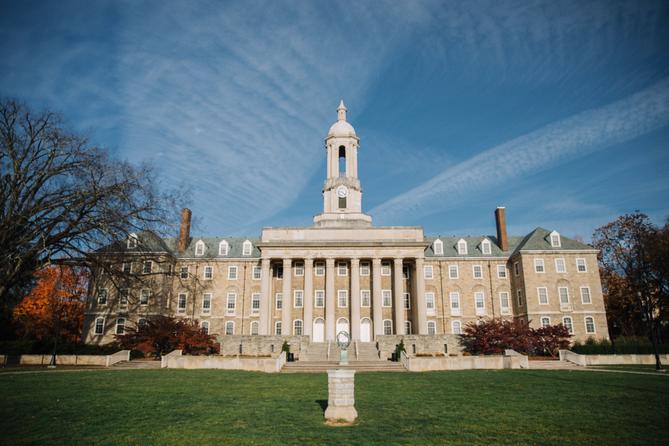Penn State leaders won’t give a straight answer about whether they’re considering closing some of the university’s commonwealth campuses, which enroll a more racially diverse group of people, a greater percentage of Pennsylvania residents, and more first-generation college students than its flagship at University Park.
Shuttering locations would impact the livelihoods of hundreds, if not thousands, of Pennsylvanians. The move would also be the most extreme action Penn State’s administration has taken in its effort to reduce a budget deficit and restructure operations.
At a Penn State Faculty Senate meeting last week, university officials — including President Neeli Bendapudi and Margo DelliCarpini, vice president for commonwealth campuses — did not directly answer employees’ questions about possible campus closures.
In response to one question, DelliCarpini spoke for more than three minutes about the importance of student success, downward trending university enrollments, shifting student demographics, Penn State’s ongoing academic program review, and how stressful change can be. Bendapudi echoed DelliCarpini's comments and said uncertainty can make people worry.
“I’m begging you, please be clear with us,” said Julie Gallagher, a Penn State Brandywine professor of history, before describing the worries of employees across the state. “… Do I buy a house? Do I not buy a house? Do I put my kids in the school system? Do I not put them in the school system? These are people’s lives. And they’re so profoundly committed to our students, I can’t tell you. But we cannot live with this level of low morale.”
A Penn State spokesperson told Spotlight PA in an email that the university is weighing changes, but no decisions have been made. (Read the university’s full response here.)
“Overall, the university is in a strong and stable position,” the spokesperson said. “This is a complex undertaking with many variables, voices and perspectives to consider, and we will move thoughtfully but as expeditiously as possible through this process.”
Closing one or more campuses could require authorization from the university’s Board of Trustees. “Regarding major changes to a campus, it depends on the specific scenario,” a university spokesperson told Spotlight PA.
Penn State’s commonwealth campuses employ more than 5,100 people across the state, according to university data from fall 2024. Undergraduate and graduate enrollments at the campuses have slumped, dipping down around 24% over the past decade — with some individual colleges down 50%, according to the university.
Last year, Penn State consolidated the leadership of several campuses and gave buyouts to nearly 400 statewide employees, which the university said would cut nearly $43 million from future budgets.
These changes paralleled steep budget cuts to the system. Under Bendapudi’s leadership, the university cut approximately 15% from the budgets of its Abington and Brandywine campuses, and more than 10% from the budgets of its Great Valley, York, and Lehigh Valley campuses over the past two completed fiscal years, according to data Penn State filed with the state’s Department of Education.
The university plans to cut an additional $54 million from the statewide system starting in July, according to the university’s budget projection.
Compared to University Park, the statewide system is more racially diverse, with a larger percentage of Asian, Black, and Hispanic students.
Additionally, more than three-quarters of students enrolled in a commonwealth campus are Pennsylvania residents, compared to just more than half at University Park.
A 2017 Pennsylvania auditor general report highlighted a nearly three-decade trend of University Park regularly enrolling more out-of-state students than residents, whose tuition is lower due to a state subsidy. Favoring students from outside Pennsylvania “would be completely contrary to PSU’s legislative history and its mission as a land-grant institution,” the report said, concluding that the trend puts Pennsylvanians, especially those from low-income families, at a disadvantage.
Some Penn State employees have expressed frustration with Bendapudi’s leadership style, arguing major decisions — such as the employee buyouts, combining the university’s two law schools, and canceling the proposed Center for Racial Justice in 2022 — were rushed and dropped on those affected by them with limited or no consultation.
In 2024, the Faculty Senate offered a cooperation agreement to the president and her administration. The proposal called for increased transparency from the administration about budget decisions and campus consolidation plans. Bendapudi declined to sign the document, writing she had met some of the faculty’s requests and that she pledged to improve shared governance.
At the Faculty Senate meeting last week, Julio Palma, a chemistry professor at Penn State Fayette, read a series of Bendapudi’s public comments, including that she was “very, very committed to the commonwealth campuses” and that there “every day you see the land-grant mission come to life.”
Palma asked the president what had changed.
“I stand by every single one of those words, that I believe in our commonwealth campus system,” Bendapudi said.
